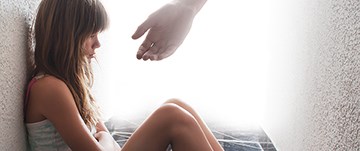A Squamish mother says she is at her wits end trying to get help for her recently suicidal nine-year-old child.
The Squamish Chief is withholding the family’s identity to protect their privacy.
The child has expressed a desire to self-harm before, the mom says, but things came to a head when the child was at school about two weeks ago and talked of suicide and expressed a way to do it. Alerted by staff at school, the mom rushed the child to the Squamish General Hospital emergency ward, but says she couldn’t get immediate help. Instead the family waited hours, she said, and was treated as if the child “had a bleeding nose or something.”
The mother is going public with her story because she wants things to be better for the next Squamish child in distress.
“If anyone ever presents at an emergency with a nine-year old that is talking about self-harm that they are seen quickly,” the mother told The Squamish Chief, expressing what she wants to result from the telling of her story.
“I can’t believe all of this,” she said. “I am educated, my family is educated. We have done everything that has been asked in the hopes of helping our child and for that to be the end result? Where do you go from there?”
Hospital response
A spokesperson for the Ministry of Children and Family Development told The Chief the mother did everything right by going to the emergency room.
“If anyone is suicidal and in need of immediate attention, the emergency room at their local hospital is their best course of action. While we cannot speak to the specifics of this case, we can tell you that Vancouver Coastal Health has received a complaint that is now with the Patient Care and Quality Office for investigation,” the spokesperson said, adding the ministry has a mental health intake clinic in Squamish located at 1100 Hunter Place, which is open Tuesdays from 9 to 11:30 a.m. and Wednesday from 1 to 3:30 p.m.
“It is important to note that if urgent care is required, a parent or youth can contact a local Child and Youth Mental Health Office during regular office hours – they do not need to wait for an intake clinic. In Squamish, parents can call: 1-604-892-1400 for support,” the spokesperson added.
The Squamish mom says there has been a breakdown on many levels regarding her child’s care.
The medical system, the school system and the mental health system all failed her family, she said.
“We are aware of where the failures are and when we do the follow through we got brushed off,” she said, her voice breaking with emotion.
The child has attention deficit hyperactivity disorder (ADHD), which hasn’t been treated appropriately in the school system and that has contributed to the child’s feelings of frustration and desire to self-harm, the mom said.
“That is where [the] frustration tips over,” she said, adding the child doesn’t talk about self-harm at home, just at school.”
The Sea to Sky School District cannot comment on specific cases, but sent The Squamish Chief the protocol if a student is in distress at school.
“Students’ mental health and safety always come first at our schools,” said principal of learning services Phillip Clarke, adding that school district staff follow four broad steps to support students and families: identify the concern, conduct an assessment of the information, intervene and follow up.
Family scared
The child and the father are First Nations and that has been a factor, the mom said, in some of the issues the family has faced.
After the mother left the hospital she went home and emailed the school and the Ministry of Children and Family Development to tell them her child was home and she had been unable to get help. Next thing she knew the RCMP was at the family’s door, she said.
Although the officer who came was “awesome” to deal with, having the police coming to the door was triggering for the child’s father, who fears having his child taken away from the family, rather than helped, the mom said.
“He is First Nations so he is very scared right now,” the mother said of her child’s father. “That comes from his own family’s experiences [with police].”
Due to the inter-generational impacts of residential school abuse, First Nations youth are at greater risk of attempting suicide, the mother noted.
Several studies have found that suicide and suicidal thoughts are much more common among First Nations youth than the non-First Nation population.
“Youth with a close family member who had committed suicide in the past 12 months, or who had a parent who attended a residential school, were more likely to have experienced suicidal thoughts,” said Saman Khan in a 2008 article in Visions Journal.
The Squamish child has a counsellor and has been to see the professional since the recent incident, and the family is now heading up to a cabin to regroup and spend some time in nature to heal, the mom said.
“We are taking a break. I am actually pulling my kids out of school for a couple of weeks,” the mom said.
“That was the last straw for me, last week.”
A relative who has his training in youth and crisis intervention is helping with an assessment and counselling of the child, the mom added.
“I shouldn’t have had to fight so hard for my son,” the mom said.
How to help
Most people who contemplate ending their lives are experiencing “overwhelming pain and hopelessness...” said associate UBC professor David Klonsky, who has studied motivations for suicide.
“Almost everywhere we look people who have attempted suicide say that they are motivated by overwhelming pain and a sense of hopelessness that they could end the pain in any other way,” he said.
Ideally someone trained in mental health would have seen the child at the hospital immediately, Klnosky said.
If that didn’t happen that could add to the child’s distress and feeling of hopelessness, he added.
“You also have this experience that there is no hope that things are going to get better and… even worse than that you see your caretaker as helpless to help, which could increase both your distress and your sense of hope,” he said.
If someone is expressing suicidal thoughts the best response from a caretaker is to express concern and support for the distressed person.
“That alone is protective because even with people who are experiencing pain and hopelessness, a sense of connectedness to things or people that matter to them is a very important protective factor,” he said.
Parents should get help if a child expresses direct signs of intent to self-harm and/or expresses a chosen method of suicide.
If you or someone you know is having thoughts of suicide, seek help. Someone is available to talk at the Crisis Intervention and Suicide Prevention Centre of BC around the clock by phone and online chat. Call 1-800-784-2433 (1-800-SUICIDE) or 1-866-661-3311 locally.





